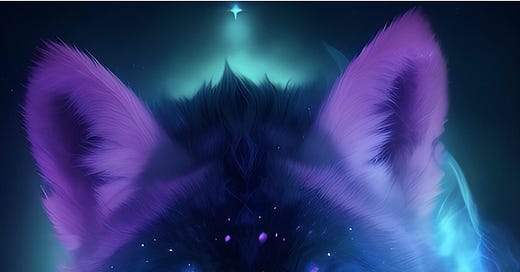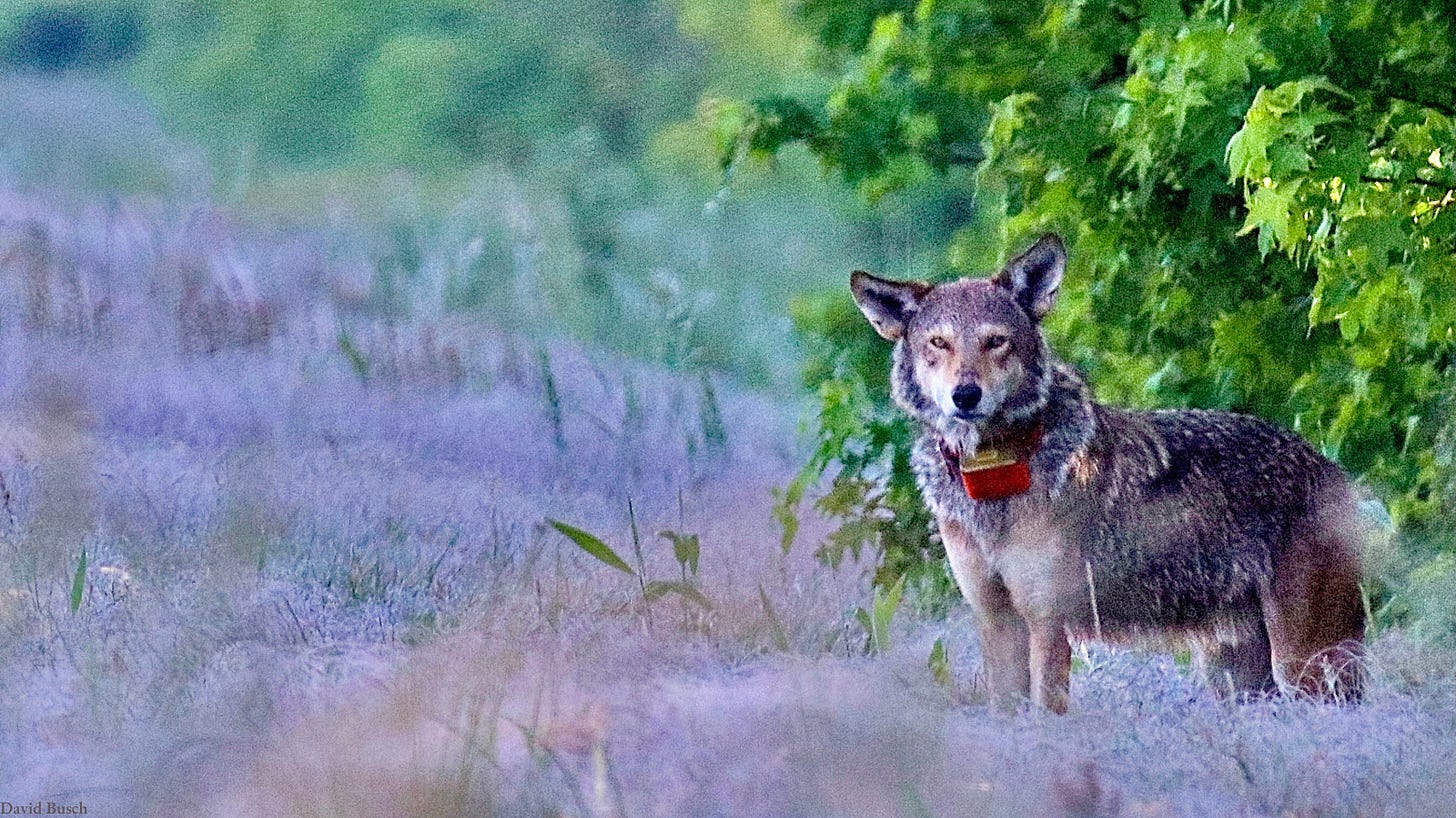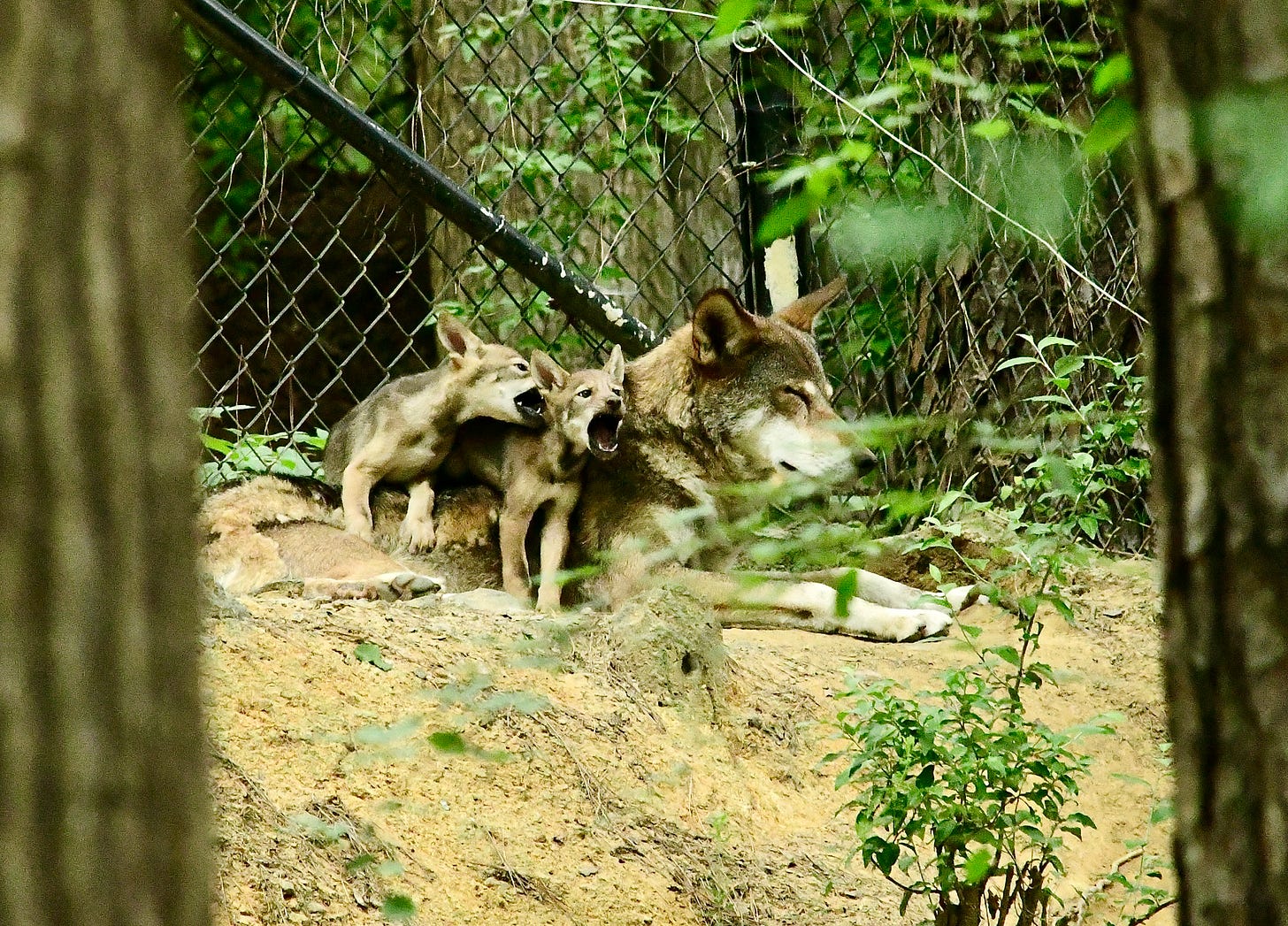On the first of December, 2024—which also happens to be the day my father died (someday, I suppose, I won’t be marking time by this milestone…?)—I got an email automatically forwarded from a fact-checker database I’d been invited to join several years ago, maintained by the Knight Science Journalism Center at MIT. I’ve occasionally received offers of contract work from writers or journalists who used the database. It’s a nice resource, but I don’t think about it or engage with it often.
Anyway, the subject of the email was MISINFORMATION AND TREASON, all caps like that. The message read as follows:
I work with (not for) the 1 million FEDERAIZED NATIONAL GUARDSMEN who're doing nationwide arrests of the CABAL....I'm sure you know who they are.
Subordinate to the CABAL are media outlets, news agencies....and FACT CHECKERS. You are one such outfit.
Tribunals and executions are taking place now in GITMO, GUAM, & DC. The military has access to 3 quantum computers which are connected to almost EVERY ELECTRONIC DEVICE...there's NO HIDING your contacts, correspondences, pictures, or analog conversations. The QUANTUM COMPUTER(S) WILL DECIDE YOUR LEVEL OF GUILT...not whether you're innocent. No attorneys will be allowed.
Your POSTS declaring a CONSPIRACY THEORY (when it's NOT) must now be redacted & corrected with a public apology.
If you fail to do these things, they'll be knocking on your door & your next stop will be GITMO.
The last choice in life you'll have is whether you want to be hung, shot or lethally injected. I'm sorry.
Good luck
My reaction was basically to think dang, what a bonkers message and then promptly move on, preoccupied with more immediate concerns. I wasn’t scared as much as amazed— amused, even: sure, go ahead and execute me without trial for my work confirming things like whether or not a species of butterfly found only in the mountainous border between Armenia and Azerbaijan is, in fact, endangered. Silliness. This was around the same time many Blacks and Latinos were receiving a surge of hateful, racist text messages, post Trump-victory, which seemed far more dangerous and hurtful and worthy of attention. With due diligence I forwarded the email to my editor at Nat Geo, in case anyone else in our research department had received a similar message, and got a note from the database administrators about “odd, threatening” messages that some people had received from an individual not affiliated with their program. I thought little else about it. My husband, when I forwarded the message to him, asked What world are we now living in?
Fact-checkers seem to be a topic of increasing interest, of late: Zuckerberg doing away with them at Facebook, Presidential debates utilizing them in real-time. I’ve been checking facts professionally in some capacity since 2003. What’s often seen as an entry-level position in journalism has been a steady source of fulfilling, often fascinating work for me for over two decades (double dang!), with breaks here and there, for things like a Fulbright (by the way, did you see how our current Administration abruptly cut off funding to Fulbright grantees, literally stranding Americans all over the world? Am I getting too political in this space by sharing that? That news about Fulbrighters is a fact; it’s something that happened, that is currently happening…). My title now is Research Editor, but fact-checking work has long involved a lot more than just verifying information—it’s also working with language, exploring nuance and sensitivity and modes of cultural expression; it involves collaborating closely with writers, editors, and experts. I also get to learn about new things all the time, approaching each assignment with a sort of clueless, curious mindset in order to not assume anything (an attitude that fits me, in general, le sigh) . I’m grateful to be able to do this work, which I see as important, even as over these many years I’ve seen fact-checking and research departments lose steam as the media landscape continues to shift and struggle.
The title of this post comes from the wonderful book The Lifespan of a Fact, a collaboration between “John D’Agata, author” and “Jim Fingal, fact-checker” that began as a magazine assignment and resulted in “seven years of arguments, negotiations, and revisions as D’Agata and Fingal struggled to navigate the boundaries of literary non-fiction.” The book, which went on to be adapted into a Broadway play if I’m not mistaken (somebody should fact-check that), consists of the magazine essay with abundant annotations and back-and-forth discussions in footnotes and the margins, between the fact-checker and the writer and sometimes an editor. These tangential discussions are often hilarious and also thought-provoking and at times quite moving. It’s a weird exploration of, as the book jacket describes, the “relationship between ‘truth’ and ‘accuracy’ and whether it is appropriate for a writer to substitute one for the other.”
I have thought about this quite a bit in the last several years, when I made a transition to writing nonfiction. As I noted in a grant application back in 2019—a grant that ended up propelling me forward in this project and my burgeoning obsession with red wolves: after receiving recognition as a young writer via publications and awards, I’ve been consumed in recent years with the arduous, mostly solitary task of finishing my first novel while also raising two children… Though anguished by recent world events, these days I also feel awakened—both as a citizen, aware of my duty to work to defend the things I believe in, and as an artist… While earlier work dealt with themes of innocence and loss, and featured characters reacting to events beyond their control, I’ve more recently been exploring autonomy and accountability, with characters making more drastic decisions, and taking more risks. I’ve experienced a similar awakening and call to action in my own life, and I’m delving headlong into writing creative nonfiction, exploring the topics I am most afraid of or puzzled by, that feel most crucial: violence, environmental degradation, and the hazards of neglect.
Even now, alongside the red wolves book I’m working on a novel (by “working on,” I mean mostly thinking about it, and occasionally jotting down notes) about a career fact-checker who is already unraveling, and then gets laid off during the pandemic—a literary ghost story).
“enhanced” portrait of a red wolf, made by my son messing around with an AI app
Facts feel both crucial and insubstantial right now. Insufficient. It’s dizzying, disillusioning—trying to hold on to a sense of truth, a shared reality. Sometimes I think I’m not sure how to do it anymore, and then I fight that feeling. Perhaps this is partly why I like fact-checking so much, after all this time—the idea of getting to the bottom of something, of exhausting all the possibilities, of revealing hidden truth. It’s why I am also drawn to the idea of being a private investigator (LOL at the idea of me actually doing that, but this episode of the Criminal podcast—consistently one of the best podcasts out there— about a woman who falls into that line of work by accident, trying to solve her college friend’s murder decades after the fact, is inspiring!). Digging and digging and digging to get to the core, to the real thing…
I’m constantly asking my kids, especially my oldest, “Where did you hear/see/read that?— I’m sure to an annoying degree—but it feels essential. I try to talk about primary sources, about skepticism and biases. I try to explain that even very real-looking things online might not, in fact, be real. That as consumers of information we need to dig deeper, especially when doing research or working on a project, to try to find the original source, to talk to experts, to understand the different sides of an issue and what might cause certain bias. More and more I feel like I’m at the far end of a tunnel, my Charlie Brown, trombone-grownup-voice echoing into the emptiness (but maybe that’s just the general feeling of parenting a tween-almost-teen?)…
So—I’ll get factual with y’all, right now: I’m feeling disgruntled about things related to the wolves. Not just their situation, their peril, which is indeed a cause for disgruntlement—but disgruntled about my writing about the wolves, the work I’m trying to do.
Some wolf advocates have seemed unhappy with me, or at least wary of me, after I reported on less-than-positive things happening in the recovery effort, like the deaths of recently-released wolves, a couple years ago... I understand the wariness. Here’s the thing: I hear a now-familiar refrain from some advocates—that the focus should be on hope, by which they mean, sharing positive developments, not dwelling on things that happened in the past. Then, from wolf-recovery opponents (perhaps not all full-fledged opponents, but people who at least have serious misgivings about it) I hear repeatedly that promises were broken and lies were told, however many decades ago. I hear about lies and broken promises, over and over and over. At this point, both the “focus on the future! move on! stay positive!” and the “they lied to us! they have no integrity!” arguments have become maddening, dizzying, a bit infuriating. There, I admit it—I am a bit furious. Probably for numerous reasons.
I think I need to harness this fury. It’s perhaps a stage of grief—grief over the program, over witnessing the (inevitable! and not necessarily damning) disappointments it has experienced, and occasional in-fighting, and the inability of some folks to hear each other, or to accept certain realities. This isn’t to say that I don’t want to keep listening, and reporting, as I have been, and trying to understand. But dang, it’s making me think about new structures for the book—new directions to take, a new sort of ruthlessness in my writing that is, frankly, exciting.
I just looked up ruthless, to make sure that’s the word I mean—and I learned a couple of things. First, when I saw the definition—“pitiless”—I thought, no, that’s not what I’m aiming for, but then upon considering a bit more, I thought: maybe it is. Because I don’t want to pity anyone in this ongoing story. I don’t want to condescend—God forbid. I am not really in this story, or I guess I am, to what extent is something I’m still figuring out—how to be in the room, but definitely not the focus. WWJD (What Would Joan Didion Do, What Would John McPhee Do)? What I mean is: I’d like my writing about this to become fiercer, firmer, more independent, less afraid of what someone might think as I can only report on what I am seeing and learning and experiencing, and everyone knows I came into this already enamored with the wolves, but with a hell of a lot to learn...
The other thing I learned when I looked up ruthless is that ruthful is also a word: “The noun ruth, which is now considerably less common than ruthless, means ‘compassion for the misery of another,’ ‘sorrow for one's own faults,’ or ‘remorse.’ And, just as it is possible for one to be without ruth, it is also possible to be full of ruth. The antonym of ruthless is ruthful, meaning "full of ruth" or "tender." Ruthful can also mean "full of sorrow" or "causing sorrow." Ruth can be traced back to the Middle English noun ruthe, itself from ruen, meaning "to rue" or "to feel regret, remorse, or sorrow."
Back to my frustration/fury in recent days: it’s certainly not all sunshine and lollipops with the wolves (my whole family loves this Simpsons episode, and its repeated references to the hilarious Lesley Gore song) ; and not every excuse that opponents to the program give have evidence beyond the anecdotal; and mistakes were made with the program; and there are reasons for hope and perseverance, and all these things are true.
One added complication: given the government’s chainsaw cuts in recent weeks. I’m told by some that there are hopes of trying to fly under the radar and escape the chopping block, to avoid a total dismantling, which would be catastrophic... Such strategies haven’t worked for countless other government agencies in recent weeks. It’s a scary time. I have felt afraid of what to say and also how to say it, not wanting to cause any additional damage, while I also feel duty to record what is actually happening.
These are all half-formed thoughts; I hope I don’t regret sharing them, later. I hope I won’t be ruthful about it. (That has a weird ring)
Thinking about anger and emotion and confusion and wolves has got me thinking about Clarissa Pinkola Estes’s Wild Woman archetype, whom I mentioned briefly in a recent post. I went back through my notes, and there are so many intoxicating passages (emphasis here mine):
Wildlife and the Wild Woman are both endangered species. They all share related instinctual archetypes, and as such, both are erroneously reputed to be ingracious, wholly and innately dangerous, and ravenous.
The modern woman is a blur of activity. She is pressured to be all things to all people.
The studies of the wolves Canis lupus and canis rufus (red wolves) are like the history of women, regarding both their spiritedness and their travails.
Healthy wolves and healthy women share certain psychic characteristics: keen sensing, playful spirit, and a heightened capacity for devotion. Wolves and women are relational by nature, inquiring, possessed of great endurance and strength. They are deeply intuitive intensely concerned with their young, their mate and their pack. They are experienced in adapting to constantly changing circumstances; they are fiercely stalwart and very brave.
Yet both have been hounded, harassed, and falsely imputed to be devouring and devious, overly aggressive, of less value than those who are their detractors. They have been the targets of those who would clean up the wilds as well as the wildish environs of the psyche, extincting the instinctual, and leaving no trace of it behind. The predation of wolves and women by those who misunderstand them is strikingly familiar.
To adjoin the instinctual nature does not mean to come undone…to act crazy or out of control…or to become less human… The wild nature has a vast integrity to it… It means to establish territory, to find one’s pack, to be in one’s body with certainty and pride regardless of the body’s gifts and limitations, to speak and act on one’s behalf, to be aware, alert, to draw on the innate feminine powers of intuition and sensing, to come into one’s cycles, to find what one belongs to, to rise with dignity, to retain as much consciousness as we can.
Photo by Robert Wilcox, Museum of Life and Science in Durham
Do facts disappear if they are deleted, erased, scrubbed from the internet? If the records that contain them are burned?
These are dizzying times.
A couple positive things:
this beautifully written, hopeful (!!) article about red wolves in the latest Garden & Gun
this thoughtful and important and well-reported article on the importance of wildlife crossings and their broad bipartisan support in Vox
This oft-shared, beautiful poem by Laura Gilpin, The Two-Headed Calf
One goofy thing:
I have 99 subscribers after a month on SubStack! I will personally mail the 100th subscriber a bag of my daughter’s handmade emergency confetti, for all your future celebratory needs (and may there be many!)—please share this newsletter with anyone who might be interested.







